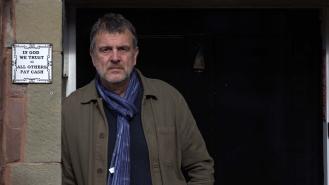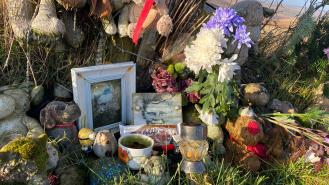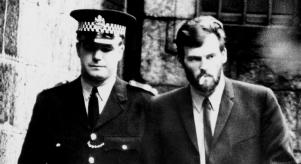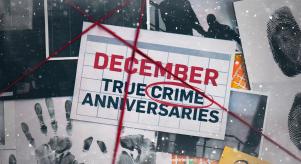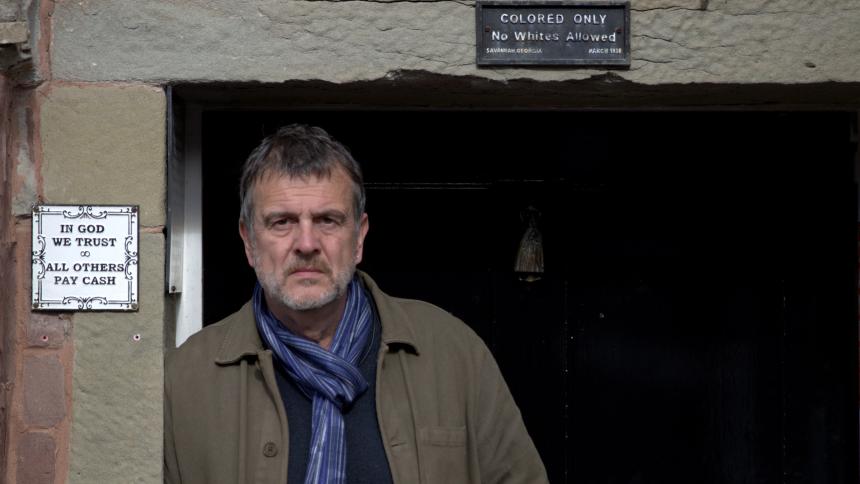
'It's impossible to understand': Novelist Mark Billingham on 'The Moors Murders'
Four of Britain’s best-known crime writers turn detective in a brand-new series Once Upon a True Crime. Featuring Peter James, Denise Mina, Mark Billingham, and Douglas Skelton, the show investigates the real-life murders that inspired some of the acclaimed authors’ most famous novels.
In the second episode, best-selling author Mark Billingham revisits the shocking, so-called Moors Murders that took place in and around Manchester between 1963 and 1965.
Billingham delves into the story of two of Britain’s most infamous serial killers, Ian Brady, and Myra Hindley, whose killing of five children became renowned as the Moors Murders. Their twisted relationship influenced his best-seller Their Little Secret which features his award-winning, fictional Detective Tom Thorne.
Crime+Investigation caught up with Mark Billingham to talk about the episode and to find out what it was like receiving a letter from Ian Brady.
Crime+Investigation: What do you think it the show adds having writers talking about the cases that inspired them?
Mark Billingham: As a writer, what I’m looking to do is tell a story. When you're talking about a case like the Moors Murders, most people know, the very basic grim facts of what happened. So, there's absolutely no point telling the same story twice. Whether I'm writing a book, whether I'm presenting a TV documentary, I've got to find some new way to come at it and find a new story to present to the viewers.
What is it about the Moors Murders that has haunted your imagination and how has the case inspired your work as a writer?
I don't think there's anybody who isn't haunted by that case. It’s spectacularly awful but I’ve always been fascinated by what is called a Folie à Deux [the madness of two]: the idea that two people can come together and create something else, almost a third entity, and what that entity can be capable of. At its very worst, in a case like Brady and Hindley, that is murder.
Although the case has never directly inspired anything in my book, I've written about that notion of two people coming together. What I did in a book of mine called ‘Their Little Secret’ was to reverse the roles. So, it’s the man who is the Hindley and the woman who is the Brady.
In the series you focus on the aftermath of the crimes. Why did you take this approach?
This is perhaps the most written about case in the last century. There would have been no point doing this one unless we could find some new way to come at it.
Hindley and Brady escaped execution by a matter of months, which is absolutely weird to think. A few months earlier and they would undoubtedly have been hung. The fact that they didn't meant that suddenly, the Prison Service had to cope with two offenders, unlike any offenders they'd ever had to handle before.
The life of the two of them behind bars, I think it's very much a different angle. We don't just want to rehash all the terrible crimes they committed, though obviously you've got to remind viewers what they did, to put everything in context, but there's no point just going over and over that. It was much more interesting to look at what happened after they were caught and imprisoned.
How involved was Myra Hindley in the murders?
It's still unclear to me what Hindley's involvement was in those crimes and it's something that still fascinates me.
By the time Brady had felt betrayed by her, notably when she was seeking parole, he very much changed his tune. At the trial he'd been trying to protect her saying that she hadn't been involved in the murders.
But later on, he said she did a lot more than he initially said she did. I'm not sure we're ever going to know quite how involved Hindley was.
Would Myra Hindley had become a murderer if she hadn’t met Ian Brady?
No, I don't think so. I really don't believe that. She was clearly someone who was looking for something, as I'm sure a lot of young women her age in a fairly depressed area in the north of England were. Any glimmer of something different was to be seized upon and Brady provided that opportunity. He was exciting and interesting and clever.
Obviously, she couldn't have known where that was going to lead, but if they had never met, I'm not sure we would ever have heard Myra Henry's name again. To this day, a lot more young women would be called Myra.
Describe what it was like receiving a letter from Ian Brady.
The first thing my wife told me was that she didn't want to have it in the house, she was extremely disturbed by it.
At the time I received it, care of a production company, I was working with a forensic psychiatrist who said, even if I didn't know who this letter was from, I can tell you just by looking at it, that there's something seriously wrong with the person who sent it.
It was rambling nonsense, most of it to be honest. He wanted me to know what a terrible time he was having. He also wanted me to know, in an almost sort of Hannibal Lecter-ish kind of way, how clever he was and how high his IQ was, all that sort of stuff.
The thing that stays with me most are the last four words of the letter. I'm not sure what he was expecting me to do or what he thought I could do, but the last four words of the letter are: 'The ball is yours'.
What is the significance of Brady’s suitcases?
One of the things we focus on in the programme are these two suitcases which are in the possession of Brady's solicitor. Legally, for reasons I still don't quite comprehend, the police are not allowed to open these suitcases.
What remains is the glimmer of hope that something in those suitcases may point the way to the whereabouts of the last victim whose body hasn't been found, Keith Bennett.
Why did Ian Brady refuse to reveal where Keith’s Bennett’s body was buried?
It's all about control, it's all about power. People like Brady, when they've had their liberty taken away from them the only power they can wield is to withhold knowledge
Do you think they will ever find the location of where Keith Bennett is buried?
I hate to say it but I'm very dubious having been up on the Moors several times. It's a constantly shifting landscape and I think it's highly unlikely, sadly.
As one of the contributors says, this case would be a footnote in history if these murders were committed by two men. How far do you agree?
Yes, I think that's probably true. There have been a great number of crimes, not quite as heinous as the crimes committed by Hindley and Brady, committed by two men, and yes, you'd struggle to remember their names.
What did grab the public imagination and shocked so many people was the fact that Hindley was a woman and women are just not supposed to commit crimes against children.
After Hindley died the law changed so prisoners like her, given a whole-life tarriff, could seek parole. Had she lived, should she have been released?
I do think that. Fifty years in prison is, by modern standards, quite outrageous.
One of the most fascinating things that I came across, while we were making the programme was a handwritten note written by Margaret Thatcher on, basically saying, 'There is no way this woman is getting out because the crimes she committed, were simply too terrible'. It is unprecedented for a politician to get involved at that level.
I don't think she would ever have been let out if she was still alive. It would be a very brave Home Secretary, who took that decision to release her even though personally I think she probably should have been paroled.
What do you hope viewers will get from this episode and understand about the case?
Understand is a sort of an odd word to use in the context of Brady and Hindley because, just looked at objectively, it's impossible to understand the crimes they committed.
I think one of the things I want them to get from the series is that possibly Brady and Hindley have had enough screen time now and enough fame and we should be thinking a lot more about why these things happen and remembering the names of the victims and honouring their memories.
Watch Once Upon A True Crime, Mondays at 9pm. New episodes available to stream weekly on Crime+Investigation.


